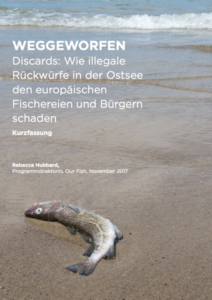Berlin, 15.11.2017: Ein heute von der europäischen Initiative für eine nachhaltige Fischereipolitik „Our Fish“ veröffentlichter Bericht über illegale Rückwürfe von Ostseefisch deckt auf, dass die mit der Reform der Gemeinsamen Fischereipolitik eingeführte Anlandepflicht in der Ostsee so gut wie nicht eingehalten wird. Diese verbietet, unerwünschten Beifang über Bord zu werfen und verpflichtet die Fischereifahrzeuge, den nicht mehr lebensfähigen Beifang mit dem erwünschten Fang an Land zu bringen und zu dokumentieren. Der sogenannte unerwünschte Beifang wird auf die Quote angerechnet.

Als Folge der Nichteinhaltung werden die EU-Lieferketten für Fischereierzeugnisse in nie dagewesenem Maße mit rechtswidrigen Praktiken belastet, denn hier verstoßen die Fischereibetriebe gegen geltende Umweltauflagen. Dem Bericht zufolge müssen die EU-Mitgliedstaaten die Umsetzung von Programmen zur Überwachung und Durchsetzung verbessern, um eine Beendigung der illegalen und verschwenderischen Rückwürfe sicherzustellen.
Die Deutsche Umwelthilfe (DUH) koordiniert in Deutschland die Aktivitäten der Initiative Our Fish, die den Bericht „Weggeworfen: Wie illegale Rückwürfe in der Ostsee den europäischen Fischereien und Bürgern schaden“ verfasst hat. Die von Our Fish durchgeführte Untersuchung zeigt, dass die Bemühungen der EU-Regierungen, die Verpflichtung zur Anlandung der wichtigsten Ostseefischarten umzusetzen, in einigen Fällen sogar zu einem Anstieg der Rückwürfe geführt haben. “Wir fordern den noch amtierenden Bundeslandwirtschaftsminister Christian Schmidt auf, für die Einhaltung der durch sein Haus selbst mit auf den Weg gebrachten Vorschriften zur Anlandeverpflichtung zu sorgen“, sagt DUH-Bundesgeschäftsführer Sascha Müller-Kraenner. „Wenn die Bundesregierung es mit der Beendigung verschwenderischer und illegaler Rückwürfe ernst meint, muss sie die völlig unzureichenden Kontroll- und Durchsetzungsversuche durch effektive elektronische Überwachungsprogramme ersetzen und zudem bei der nationalen Aufteilung von Fangquoten dafür sorgen, dass nachweislich vorschriftsmäßig fischende Betriebe mit einer höheren Quote belohnt werden als solche, die hiergegen verstoßen haben.“
Der Bericht legt dar, wie die unzureichende Umsetzung der Anlandeverpflichtung in der Ostsee die Nachhaltigkeit der regionalen Fischbestände und insbesondere der wirtschaftlich bedeutenden und bei den Verbrauchern beliebten Zielart Dorsch gefährdet. Dorsch, wie der Kabeljau in der Ostsee genannt wird, ist an Fischtheken und in Tiefkühltruhen vieler europäischer Supermärkte zu finden. Laut wissenschaftlichen Erhebungen werden 90 Prozent der untermaßigen, d.h. für eine Vermarktung als Speisefisch zu kleinen Dorsche ins Meer zurückgeworfen und nicht, wie vorgeschrieben, für eine weniger einträgliche Vermarktung an Land gebracht. Allein 2016 wurden etwa 11,5 Millionen Dorsche illegal zurückgeworfen und damit als Ressource vernichtet. „Einzelhandel und Endkunden dürften schockiert sein zu erfahren, dass ihr Dorsch mit hoher Wahrscheinlichkeit aus einer Fischerei mit illegalen Rückwürfen stammt“, sagt Rebecca Hubbard, Programmdirektorin von Our Fish. „Auch der Einzelhandel sollte ein Interesse an der schnellstmöglichen Einführung der elektronischen Überwachung in EU-Fischereien haben, um die Einhaltung geltender Rechtsvorschriften in der Lieferkette zu gewährleisten. Die Rückwurf-Problematik ist bei den Dorsch-Fischereien besonders drastisch, aber keineswegs auf sie allein beschränkt.“
Hintergrund:
Über die Anlandeverpflichtung
Mit der Reform der Gemeinsamen Fischereipolitik (GFP), in Kraft seit dem 1.1.2014, wurde eine Anlandverpflichtung für Arten eingeführt, für die jährlich festgelegte Gesamtfangmengen gelten (Art. 15 der GFP-Grundverordnung, Verordnung (EU) Nr. 1380/2013 vom 11. Dezember 2013). Für diese Arten wird die Verwendung von Fängen unterhalb festgelegter Mindestreferenzgrößen auf andere Zwecke als den menschlichen Verzehr (beispielsweise Tierfutter oder Fischöl) beschränkt. Alle Fänge werden in gleicher Weise auf die jeweilige Quote angerechnet. Auf diese Weise sollen Rückwürfe, vor allem aber bereits die unerwünschten Fänge vermieden werden. Die geringeren Erlöse für angelandete Beifänge bilden einen Anreiz für den Gebrauch von Fanggeräten mit einer verbesserten Selektivität. Das bedeutet, dass Fanggeräte so konstruiert sind, dass unerwünschte Fänge minimiert werden, etwa durch größere Maschenweiten der Netze.
In der Ostsee gilt die Anlandeverpflichtung für Hering, Sprotte, Dorsch und Lachs seit 2015, für Scholle erst seit 2017. Bis 2019 soll sie in allen EU-Gewässern in Kraft sein.
Über Our Fish
Our Fish will sicherstellen, dass die EU-Mitgliedstaaten die Gemeinsame Fischereipolitik umsetzen und für nachhaltige Fischbestände in den europäischen Gewässern sorgen.
Our Fish arbeitet mit Organisationen und Personen in ganz Europa zusammen, um eine starke und beharrliche Kernbotschaft zu verbreiten: Die Überfischung muss beendet und die nachhaltige Befischung der europäischen Meere gewährleistet werden. Our Fish fordert die ordnungsgemäße Durchführung der Gemeinsamen Fischereipolitik und die effektive Kontrolle der europäischen Fischereien.
Our Fish ruft alle EU-Mitgliedstaaten dazu auf, nachhaltige Fanggrenzen auf der Grundlage wissenschaftlicher Empfehlungen festzulegen, und durch Überwachung und Dokumentation aller Fänge sicherzustellen, dass ihre Fangflotten den Nachweis einer nachhaltigen Fischerei erbringen.
http://our.fish
Link:
Zum Bericht: our.fish/thrownaway2017
Kontakt:
Rebecca Hubbard, Programmdirektorin Our Fish
+34 657669425, rebecca@our.fish
Sascha Müller-Kraenner, Bundesgeschäftsführer
0160 90354509, mueller-kraenner@duh.de
Ulrich Stöcker, Leiter Naturschutz
0160 8950556, stoecker@duh.de
DUH-Pressestelle:
Andrea Kuper, Ann-Kathrin Marggraf
030 2400867-20, presse@duh.de
www.duh.de, www.twitter.com/umwelthilfe, www.facebook.com/umwelthilfe

















